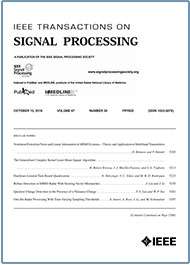- Our Story
- Publications & Resources
- Publications & Resources
- Publications
- IEEE Signal Processing Magazine
- IEEE Journal of Selected Topics in Signal Processing
- IEEE Signal Processing Letters
- IEEE Transactions on Computational Imaging
- IEEE Transactions on Image Processing
- IEEE Transactions on Information Forensics and Security
- IEEE Transactions on Multimedia
- IEEE Transactions on Signal and Information Processing over Networks
- IEEE Transactions on Signal Processing
- IEEE TCI
- IEEE TSIPN
- Data & Challenges
- Submit Manuscript
- Guidelines
- Information for Authors
- Special Issue Deadlines
- Overview Articles
- Top Accessed Articles
- SPS Newsletter
- SigPort
- SPS Resource Center
- Publications FAQ
- Blog
- News
- Dataset Papers
- Conferences & Events
- Community & Involvement
- Professional Development
- For Volunteers
- Information for Authors-OJSP
-
Home
Conferences Events IEEE Signal Processing Magazine IEEE SPL Article IEEE TIFS Article IEEE TMM Article IEEE TSP Article Jobs in Signal Processing Lectures Machine Learning Seasonal Schools Signal Processing News SPM Article SPS Distinguished Lectures SPS Newsletter Article SPS Webinar SPS Webinars SPS Webinar Series Webinar webinars
-
Our Story
What is Signal Processing?

The technology we use, and even rely on, in our everyday lives –computers, radios, video, cell phones – is enabled by signal processing. Learn More » -
Publications & Resources
-
SPS Resources
- Signal Processing Magazine The premier publication of the society.
- SPS Newsletter Monthly updates in Signal Processing
- SPS Resource Center Online library of tutorials, lectures, and presentations.
- SigPort Online repository for reports, papers, and more.
- SPS Feed The latest news, events, and more from the world of Signal Processing.
-
SPS Resources
-
Conferences & Events
-
Community & Involvement
-
Membership
- Join SPS The IEEE Signal Processing Magazine, Conference, Discounts, Awards, Collaborations, and more!
- Chapter Locator Find your local chapter and connect with fellow industry professionals, academics and students
- Women in Signal Processing Networking and engagement opportunities for women across signal processing disciplines
- Students Scholarships, conference discounts, travel grants, SP Cup, VIP Cup, 5-MICC
- Young Professionals Career development opportunities, networking
- Get Involved
-
Technical Committees
- Applied Signal Processing Systems
- Audio and Acoustic Signal Processing
- Bio Imaging and Signal Processing
- Computational Imaging
- Image Video and Multidimensional Signal Processing
- Information Forensics and Security
- Machine Learning for Signal Processing
- Multimedia Signal Processing
- Sensor Array and Multichannel
- Signal Processing for Communication and Networking
- Signal Processing Theory and Methods
- Speech and Language Processing
- Technical Working Groups
- More TC Resources
-
Membership
-
Professional Development
-
Professional Development
- Signal Processing Mentorship Academy (SigMA) Program
- Micro Mentoring Experience Program (MiME)
- Distinguished Lecturer Program
- Distinguished Lecturers
- Distinguished Lecturer Nominations
- Past Lecturers
- Distinguished Industry Speaker Program
- Distinguished Industry Speakers
- Distinguished Industry Speaker Nominations
- Industry Resources
- IEEE Training Materials
- Jobs in Signal Processing: IEEE Job Site
-
Career Resources
- SPS Education Program Educational content in signal processing and related fields.
- Distinguished Lecturer Program Chapters have access to educators and authors in the fields of Signal Processing
- Job Opportunities Signal Processing and Technical Committee specific job opportunities
- Job Submission Form Employers may submit opportunities in the area of Signal Processing.
-
Professional Development
-
For Volunteers
-
For Board & Committee Members
- Board Agenda/Minutes* Agendas, minutes and supporting documentation for Board and Committee Members
- SPS Directory* Directory of volunteers, society and division directory for Board and Committee Members.
- Membership Development Reports* Insight into the Society’s month-over-month and year-over-year growths and declines for Board and Committee Members
-
For Board & Committee Members
Popular Pages
Today's:
- Information for Authors
- (ICME 2026) 2026 IEEE International Conference on Multimedia and Expo
- IEEE Transactions on Multimedia
- IEEE Transactions on Image Processing
- IEEE Transactions on Information Forensics and Security
- Conference Call for Papers
- IEEE Journal of Selected Topics in Signal Processing
- Information for Authors-SPL
- 2025 IEEE SPS Chapter Initiative: S.P.A.R.C. – Signal Processing, AI & Real-time Computing Camp
- Submit a Manuscript
- IEEE Signal Processing Letters
- IEEE JSTSP Special Issue on Advanced AI and Signal Processing for Low-Altitude Wireless Networks
- (ASRU 2025) 2025 IEEE Automatic Speech Recognition and Understanding Workshop
- IEEE Transactions on Signal Processing
- Guidelines for Reviewers
All time:
- Information for Authors
- Submit a Manuscript
- IEEE Transactions on Image Processing
- IEEE Transactions on Information Forensics and Security
- IEEE Transactions on Multimedia
- IEEE Transactions on Audio, Speech and Language Processing
- IEEE Signal Processing Letters
- IEEE Transactions on Signal Processing
- Conferences & Events
- IEEE Journal of Selected Topics in Signal Processing
- Information for Authors-SPL
- Conference Call for Papers
- Signal Processing 101
- IEEE Signal Processing Magazine
- Guidelines
Last viewed:
- IEEE Journal of Selected Topics in Signal Processing
- IEEE JSTSP Special Issue on Advanced AI and Signal Processing for Low-Altitude Wireless Networks
- Submit Your 2026 ICASSP Workshop Paper
- SPS Scholarship Program
- IEEE Transactions on Multimedia
- Conference Call for Papers
- 2025 IEEE SPS Forum on AI-Driven Innovations in Healthcare: Transforming Diagnosis, Treatment, and Delivery
- Conferences
- (ICME 2026) 2026 IEEE International Conference on Multimedia and Expo
- Signal Processing Cup
- (ISBI 2026) 2026 IEEE 23rd International Symposium on Biomedical Imaging
- Information for Authors
- Guidelines for Senior Area Editors
- Editorial Board
- IEEE Transactions on Image Processing
Communication-Censored ADMM for Decentralized Consensus Optimization
You are here
Transactions on Signal Processing
Publications & Resources
For Authors
Top Reasons to Join SPS Today!
1. IEEE Signal Processing Magazine
2. Signal Processing Digital Library*
3. Inside Signal Processing Newsletter
4. SPS Resource Center
5. Career advancement & recognition
6. Discounts on conferences and publications
7. Professional networking
8. Communities for students, young professionals, and women
9. Volunteer opportunities
10. Coming soon! PDH/CEU credits
Click here to learn more.
Communication-Censored ADMM for Decentralized Consensus Optimization
In this paper, we devise a communication-efficient decentralized algorithm, named as communication-censored alternating direction method of multipliers (ADMM) (COCA), to solve a convex consensus optimization problem defined over a network. Similar to popular decentralized consensus optimization algorithms such as ADMM, at every iteration of COCA, a node exchanges its local variable with neighbors, and then updates its local variable according to the received neighboring variables and its local cost function. A different feature of COCA is that a node is not allowed to transmit its local variable to neighbors, if this variable is not sufficiently different to the previously transmitted one. The sufficiency of the difference is evaluated by a properly designed censoring function. Though this censoring strategy may slow down the optimization process, it effectively reduces the communication cost. We prove that when the censoring function is properly chosen, COCA converges to an optimal solution of the convex consensus optimization problem. Furthermore, if the local cost functions are strongly convex, COCA has a fast linear convergence rate. Numerical experiments demonstrate that, given a target solution accuracy, COCA is able to significantly reduce the overall communication cost compared to existing algorithms including ADMM, and hence fits for applications where network communication is a bottleneck.
SPS Social Media
- IEEE SPS Facebook Page https://www.facebook.com/ieeeSPS
- IEEE SPS X Page https://x.com/IEEEsps
- IEEE SPS Instagram Page https://www.instagram.com/ieeesps/?hl=en
- IEEE SPS LinkedIn Page https://www.linkedin.com/company/ieeesps/
- IEEE SPS YouTube Channel https://www.youtube.com/ieeeSPS
Home | Sitemap | Contact | Accessibility | Nondiscrimination Policy | IEEE Ethics Reporting | IEEE Privacy Policy | Terms | Feedback
© Copyright 2025 IEEE - All rights reserved. Use of this website signifies your agreement to the IEEE Terms and Conditions.
A public charity, IEEE is the world's largest technical professional organization dedicated to advancing technology for the benefit of humanity.










